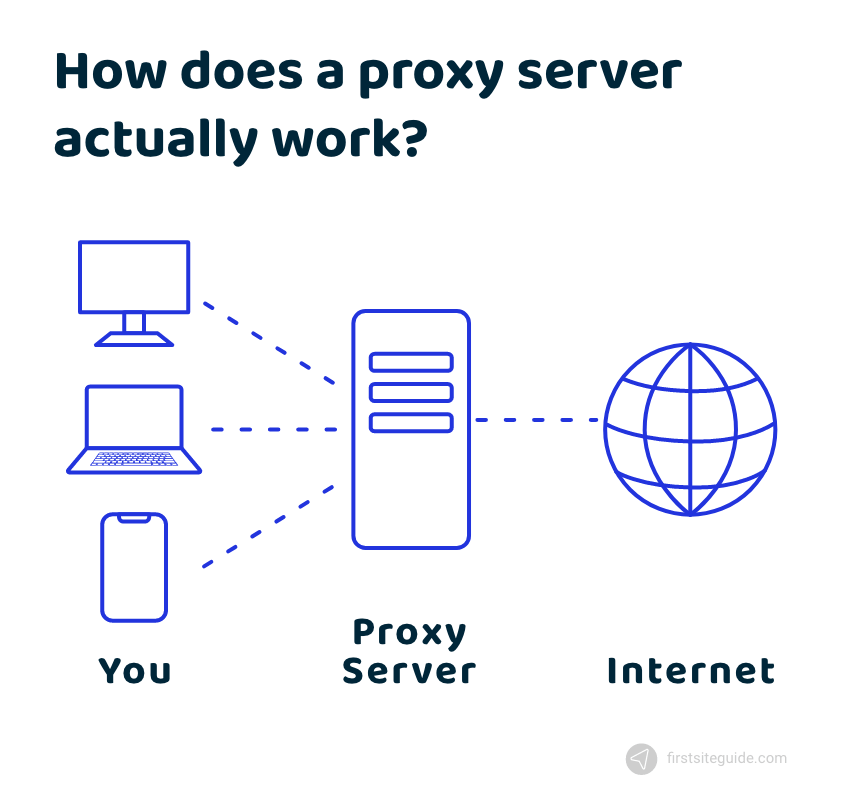In the current cyber era, internet security and privacy have never been more crucial. As we navigate the vast landscape of the web, the threat of exposing sensitive data has increased dramatically. One of the most effective tools in safeguarding your online presence is a proxy system. But what precisely is a proxy, and how does it work? Understanding the role of proxy servers can enable you to make informed decisions about your digital activities and improve your digital security.
Proxy servers function as middlemen between your computer and the internet, allowing you to access sites and services while masking your internet protocol address. This not just helps protect your confidentiality but also offers multiple benefits, such as enhanced safety, bypassing geographic limitations, and even boosting online efficiency. In this article, we will examine the complex workings of proxy, contrast them with other privacy tools like virtual private networks, and delve into their advantages and potential downsides. Whether you're an person seeking online privacy or a business looking to strengthen security measures, understanding proxy is crucial in navigating the complexities of the online world.
Grasping Proxy Servers
A intermediary server acts as an intermediary between your device and the web. When you visit a site through a proxy server, your calls are directed to the intermediary first, which then passes them to the target site. This mechanism helps mask your IP address, making it seem as though the intermediary's IP is the entity interacting with the site. As a result, people can keep a degree of privacy online while using various internet resources.
Proxy servers come in multiple categories, each serving special purposes. For instance, HTTP proxies are mainly used for internet browsing, while SOCKS proxies can handle any form of data flow, including FTP and P2P. Transparent proxies do not alter queries and are frequently used in corporate networks to monitor staff activity without necessitating setup. Comprehending these forms enables individuals to choose the right intermediary for their specific requirements, whether it's for protection, security, or effectiveness.
The employment of proxy servers is not just limited to individual users. Many companies employ proxy servers to improve their online security measures, improve worker productivity, and collect data insights. For Find more information , organizations may deploy proxy servers to access data securely from various places while also shielding their identity. As the internet space changes, comprehending how proxies operate is crucial for both users and businesses looking to navigate online challenges effectively.
Benefits and Protection of Proxies
Utilizing a proxy server offers several advantages that boost online privacy and security. By functioning as an middleman between your device and the internet, proxies can conceal your IP address, making it more difficult for websites to monitor your online activities. This anonymity helps protect your personal information from potential threats, particularly when surfing on public Wi-Fi networks. With a proxy, sensitive data remains hidden, lowering the risk of identity theft and cyberattacks.
In addition, to enhancing privacy, proxy servers play a crucial role in security. They can monitor incoming and outgoing traffic, sifting through malicious content and blocking harmful sites. Many organizations utilize proxy servers as an added layer of defense against cybersecurity threats. By examining web traffic, businesses can identify unusual patterns that may indicate a breach, allowing them to act swiftly to safeguard sensitive information.
Furthermore, many proxies come furnished with features such as encryption, which enhances security even more. While not all proxies offer the same level of protection, those that do can encrypt data sent between the user and the server, enhancing security during data transfers. This is particularly important when retrieving sensitive information or conducting transactions online, as it ensures that your data remains confidential and secure from prying eyes.
Using Proxy Servers for Streaming and Online Gaming
Streaming services frequently enforce geo-based limitations that can prevent users from viewing certain content libraries. Employing a proxy server can help overcoming these geographical barriers, enabling you to view a wider array of shows and movies. By redirecting your traffic via a server situated in a distinct nation, you can present yourself as though you are accessing content from that region, enabling access to content that might otherwise be accessible in your area. This feature is particularly beneficial for those looking to access services like Netflix or Hulu that have different accessibility based on geographic locations.
In conjunction to enhancing your viewing experience, proxies can also considerably assist gamers. Many online games restrict access based on IP addresses and can prohibit users for various causes. By using a proxy server, players can mask their real IP location and minimize the risk of being prohibited while participating in online gaming. Furthermore, proxies can help lessen latency and improve connection stability by connecting you to the gaming servers more effectively, providing a more seamless gaming experience.
Nevertheless, not all proxies are the same, especially regarding streaming and gaming. It's crucial to select dependable and fast proxy servers to avoid laggy connections and potential interruptions. Numerous gamers and streamers prefer dedicated proxies or those specifically designed for high bandwidth activities, ensuring peak performance during key gaming sessions or while binge-watching favorite shows. This careful selection can help maintain not just access to content but also the overall quality of the experience.

